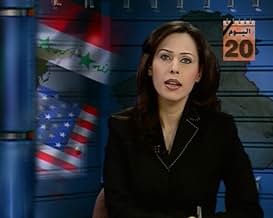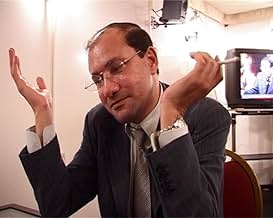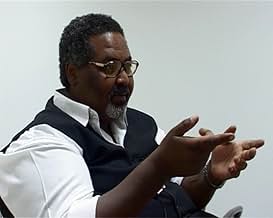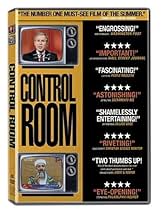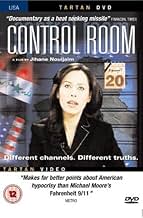NOTE IMDb
7,6/10
5,3 k
MA NOTE
Ajouter une intrigue dans votre langueA documentary on perception of the United States's war with Iraq, with an emphasis on Al Jazeera's coverage.A documentary on perception of the United States's war with Iraq, with an emphasis on Al Jazeera's coverage.A documentary on perception of the United States's war with Iraq, with an emphasis on Al Jazeera's coverage.
- Réalisation
- Scénario
- Casting principal
- Récompenses
- 9 victoires et 10 nominations au total
Josh Rushing
- Self
- (as Lt. Josh Rushing)
George W. Bush
- Self
- (images d'archives)
Donald Rumsfeld
- Self
- (images d'archives)
Avis à la une
They are a horde of sand monkeys screaming hysterically, jumping up and down, waving their fists in the air, and they all have their heads wrapped in tablecloths stolen from Italian restaurants -- right? Well, not quite, according to this documentary from Noujaim, which focuses on the producers and staff of the much-maligned al Jaziera satellite news channel which broadcasts to the Arab-speaking world.
The reporter we get to know best, a big guy who looks like Luciano Pavarotti in makeup for a performance of Otello, and who speaks English fluently (his wife is an Englishwoman), is like most other reporters of whatever channel or nationality -- practical, cynical, and good humored. He doesn't give us an anti-American diatribe. He's way too cool for that. He's watching, for instance, the tape of a demonstration in which yelling, leaping children surround some Americans entering Baghdad and he's listening to the English translation. The children are shouting "Allah" something or other and the on screen translator comments that the kids are saying "God be with you Americans!" The reporter smiles and turns to the camera, explaining that what the kids are actually saying is, "God damn you Americans." He has a keen sense of irony.
So does another translator who is watching Bush's "Mission Accomplished" speech on live TV and giving the Arabic translation to the audience. When Bush is finally finished telling us how successful we and our allies have been, how the war has ended, the translator shuts off his mike, lowers his face and wordlessly chuckles.
At another point, after the victory, Iraqis are seen breaking into a bank, emerging which armfuls of money, which they then gleefully tear up and toss in the air. Watching this on TV an al Jaziera staff member remarks that these are Kurds and they're tearing up the dough because it's the new Dinar with Saddam's picture, and in that region they've always used the old pre-1991 currency. At the same time, elsewhere, an American newsman (from CNN, I think) is watching the scene and calls to someone to find out what it is these looters are tearing up. Is it money, or what? And when asked at a briefing to explain why these looting incidents are going on in the destroyed and chaotic cities, an American general replies that this was going on under the noses of the Iraqis themselves. (In other words, some Iraqi authority should have put a stop to it.) But the film makers are mistaken if they think that most of this isn't already known to American audiences. The problem isn't so much that American audiences were ignorant of some of these things, but that they preferred the perception to the substance. Take the concept of victory. The perception is "the liberated people" pulling down a statue of the reviled Hussein. That's part of the substance too. Another part of the substance is videotape of dead and bloody American bodies sprawled on a cement floor, a part that, like the coffins arriving at Dover AFB, we'd rather exclude. Al Jaziera showed both scenes.
I don't mean any of this to sound too simple minded. It's a thorny problem. Exactly how do you edit the substance so that what appears in the media is acceptable -- in the sense that it doesn't get you fired or killed. The journalist's code of course is to be "objective," but objectivity itself depends on perception.
A sympathetic Marine captain, seen in several interviews, doing his best to answer unanswerable questions, poses the conundrum in its most basic form. Something like, "I was watching American TV and saw shots of these bodies of dead civilians, including kids, and I thought, that's too bad. Then I ate dinner and went to sleep. Recently I was watching al Jaziera and saw shots of bodies of dead American GIs, and I really got MAD. Then I thought, maybe THEY feel the same way." The officer is a surprisingly earnest guy in an impossible job. He's trying to learn Arabic, is terribly flattered when asked to come home and have dinner with Pavarotti and his English wife. His happiness at being treated amicably is almost palpable.
If you put the wrong material on the air, you're liable to pay for it. Al Jaziera's headquarters in Baghdad was bombed during the war and one of its reporters killed. Another Arab news agency was bombed at the same time, and a hotel too. The financial reporter from al Jaziera was banned from the New York Stock Exchange too. (Not mentioned in this film.) We're going to have to wait for another documentary to explain the reasons for that, I guess.
The reporter we get to know best, a big guy who looks like Luciano Pavarotti in makeup for a performance of Otello, and who speaks English fluently (his wife is an Englishwoman), is like most other reporters of whatever channel or nationality -- practical, cynical, and good humored. He doesn't give us an anti-American diatribe. He's way too cool for that. He's watching, for instance, the tape of a demonstration in which yelling, leaping children surround some Americans entering Baghdad and he's listening to the English translation. The children are shouting "Allah" something or other and the on screen translator comments that the kids are saying "God be with you Americans!" The reporter smiles and turns to the camera, explaining that what the kids are actually saying is, "God damn you Americans." He has a keen sense of irony.
So does another translator who is watching Bush's "Mission Accomplished" speech on live TV and giving the Arabic translation to the audience. When Bush is finally finished telling us how successful we and our allies have been, how the war has ended, the translator shuts off his mike, lowers his face and wordlessly chuckles.
At another point, after the victory, Iraqis are seen breaking into a bank, emerging which armfuls of money, which they then gleefully tear up and toss in the air. Watching this on TV an al Jaziera staff member remarks that these are Kurds and they're tearing up the dough because it's the new Dinar with Saddam's picture, and in that region they've always used the old pre-1991 currency. At the same time, elsewhere, an American newsman (from CNN, I think) is watching the scene and calls to someone to find out what it is these looters are tearing up. Is it money, or what? And when asked at a briefing to explain why these looting incidents are going on in the destroyed and chaotic cities, an American general replies that this was going on under the noses of the Iraqis themselves. (In other words, some Iraqi authority should have put a stop to it.) But the film makers are mistaken if they think that most of this isn't already known to American audiences. The problem isn't so much that American audiences were ignorant of some of these things, but that they preferred the perception to the substance. Take the concept of victory. The perception is "the liberated people" pulling down a statue of the reviled Hussein. That's part of the substance too. Another part of the substance is videotape of dead and bloody American bodies sprawled on a cement floor, a part that, like the coffins arriving at Dover AFB, we'd rather exclude. Al Jaziera showed both scenes.
I don't mean any of this to sound too simple minded. It's a thorny problem. Exactly how do you edit the substance so that what appears in the media is acceptable -- in the sense that it doesn't get you fired or killed. The journalist's code of course is to be "objective," but objectivity itself depends on perception.
A sympathetic Marine captain, seen in several interviews, doing his best to answer unanswerable questions, poses the conundrum in its most basic form. Something like, "I was watching American TV and saw shots of these bodies of dead civilians, including kids, and I thought, that's too bad. Then I ate dinner and went to sleep. Recently I was watching al Jaziera and saw shots of bodies of dead American GIs, and I really got MAD. Then I thought, maybe THEY feel the same way." The officer is a surprisingly earnest guy in an impossible job. He's trying to learn Arabic, is terribly flattered when asked to come home and have dinner with Pavarotti and his English wife. His happiness at being treated amicably is almost palpable.
If you put the wrong material on the air, you're liable to pay for it. Al Jaziera's headquarters in Baghdad was bombed during the war and one of its reporters killed. Another Arab news agency was bombed at the same time, and a hotel too. The financial reporter from al Jaziera was banned from the New York Stock Exchange too. (Not mentioned in this film.) We're going to have to wait for another documentary to explain the reasons for that, I guess.
I'll be the first to admit that this film is good but not great. All politics aside, I was just left hanging in the balance wanting MORE. Though I can appreciate their limited access to outside footage and English-speaking counterparts, certain scenes tended to drag on a bit and left me wondering what could have been.
That said, per my subject heading, I feel that this should be REQUIRED viewing for any concerned citizen grappling with the media coverage and news-spin of this and all other wars. Much like BRAVO's "Anatomy Of A Scene", the unfolding of the 'end of the war' and the subsequent toppling of Saddam's statue in the square both serve as serious examples of Al Jazeera news coverage vs. 'The Big Boys'. It's just completely different when seen through the intelligent, capable eyes of the Al-Jazeera staff than what we're spoon-fed by Fox, et. al. Check it out...... Really.....
That said, per my subject heading, I feel that this should be REQUIRED viewing for any concerned citizen grappling with the media coverage and news-spin of this and all other wars. Much like BRAVO's "Anatomy Of A Scene", the unfolding of the 'end of the war' and the subsequent toppling of Saddam's statue in the square both serve as serious examples of Al Jazeera news coverage vs. 'The Big Boys'. It's just completely different when seen through the intelligent, capable eyes of the Al-Jazeera staff than what we're spoon-fed by Fox, et. al. Check it out...... Really.....
For me, Al-Jazeera means one thing: proof. When I think of how skewed and yellow video journalism is, I remember that millions and millions of people in the world are getting their news from Al-Jazeera. That's my proof that there is hope for the world. That they are willing to challenge and question everything from Arab leaders to the United States to the nature of unbiased news coverage
Since their start in 1996, they've been slammed in the Arab world for being too pro-American and by the US for being pro-Al Qaeda. As most good lefties know, that usually means you're doing something right. I have much respect for Al-Jazeera and was excited to know that a documentary was being made about them and their take on the War with Iraq.
The film "Control Room" is further proof. With time-tested verité technique, we see what it is like to run Al-Jazeera and what kinds of people make up the staff from the translators to the journalists. The film travels back and forth between the stations headquarters in Qatar and CentCom which is the main press briefing room set up by the US military in Iraq. It's a breath of fresh air to see an entire network of people who are smart and committed to the idea of debate and communication. I don't think you could find that at any of the major news networks in the States. Their operations, anecdotes and analysis are worthy of a documentary alone.
But there are specific moments in the film that are especially profound and upsetting even to a long-time commie like myself. First and foremost, there is the death of an Al-Jazeera journalist. Before the troops entered Baghdad, the US committed air strikes on civilian targets including the building housing Al-Jazeera. In the attack, one of their correspondents is killed along with three other journalists. There is footage of the journalist facing him head-on right up until seconds before the attack. That along with a plea for justice from the journalist's wife and a completely absurd justification for the attack from the US is both infuriating and literally sickening.
The second most important moment in the film is the so-called liberation of Baghdad. As a result of the attack on Al-Jazeera, their remaining correspondents were forced to return home to Qatar where the network is based. Now recognized as a target of the US military, Iraqis were naturally hesitant to house anyone representing the station. In the end, only the ridiculous foreign press was there to cover the troops coming into the town square and the people toppling over the statue of Saddam Hussein. What's most illuminating is the analysis from the Al-Jazeera journalists as they watch the events unfold. Senior Producer Samir Khader talks about how he's from Iraq. He's lived in Iraq. The people that toppled the statue were not Iraqi. They didn't look Iraqi and they didn't have Iraqi accents. Another journalist wonders why there are only a dozen people celebrating. Where were the village people? Where were the women from the area? How is it that one of them just happened to have the old Iraqi flag in his pocket? Had he "just kept it there for the past ten years?" Producer Deema Khatib wonders where the troops were. Where was the army? It becomes very obvious, as people have been muttering for some time now that it was all a faked, staged event for Western "news" cameras.
Finally there is the case of Lt. Josh Rushing. Throughout the film, he is the American representative that has debates and discussions with the many Arab journalists. Despite having to take the absurd position of defending US aggression, he is intelligent and empathetic. At one point he becomes self-analytical and candid talking about how he had seen images of dead Iraqi casualties one day and it didn't affect him. The next day, he was footage of American casualties and it made him sick. At that point he really had to face himself and while still in the process at least recognize how much he hates war. That story doesn't end there. With the release of the film, the Pentagon ordered Rushing not to comment on the film. Offended by this gesture, he is now seeking to leave the Marines.
"Control Room" is a movie about the War with Iraq. But that's not the half of it. It's a movie that will hopefully widen the debate about television and what is objective journalism in this country. It's also another stone catapulted through the wall of Arab stereotypes. It's also an intelligent and engaging film that is as challenging as it is satisfying.
The film "Control Room" is further proof. With time-tested verité technique, we see what it is like to run Al-Jazeera and what kinds of people make up the staff from the translators to the journalists. The film travels back and forth between the stations headquarters in Qatar and CentCom which is the main press briefing room set up by the US military in Iraq. It's a breath of fresh air to see an entire network of people who are smart and committed to the idea of debate and communication. I don't think you could find that at any of the major news networks in the States. Their operations, anecdotes and analysis are worthy of a documentary alone.
But there are specific moments in the film that are especially profound and upsetting even to a long-time commie like myself. First and foremost, there is the death of an Al-Jazeera journalist. Before the troops entered Baghdad, the US committed air strikes on civilian targets including the building housing Al-Jazeera. In the attack, one of their correspondents is killed along with three other journalists. There is footage of the journalist facing him head-on right up until seconds before the attack. That along with a plea for justice from the journalist's wife and a completely absurd justification for the attack from the US is both infuriating and literally sickening.
The second most important moment in the film is the so-called liberation of Baghdad. As a result of the attack on Al-Jazeera, their remaining correspondents were forced to return home to Qatar where the network is based. Now recognized as a target of the US military, Iraqis were naturally hesitant to house anyone representing the station. In the end, only the ridiculous foreign press was there to cover the troops coming into the town square and the people toppling over the statue of Saddam Hussein. What's most illuminating is the analysis from the Al-Jazeera journalists as they watch the events unfold. Senior Producer Samir Khader talks about how he's from Iraq. He's lived in Iraq. The people that toppled the statue were not Iraqi. They didn't look Iraqi and they didn't have Iraqi accents. Another journalist wonders why there are only a dozen people celebrating. Where were the village people? Where were the women from the area? How is it that one of them just happened to have the old Iraqi flag in his pocket? Had he "just kept it there for the past ten years?" Producer Deema Khatib wonders where the troops were. Where was the army? It becomes very obvious, as people have been muttering for some time now that it was all a faked, staged event for Western "news" cameras.
Finally there is the case of Lt. Josh Rushing. Throughout the film, he is the American representative that has debates and discussions with the many Arab journalists. Despite having to take the absurd position of defending US aggression, he is intelligent and empathetic. At one point he becomes self-analytical and candid talking about how he had seen images of dead Iraqi casualties one day and it didn't affect him. The next day, he was footage of American casualties and it made him sick. At that point he really had to face himself and while still in the process at least recognize how much he hates war. That story doesn't end there. With the release of the film, the Pentagon ordered Rushing not to comment on the film. Offended by this gesture, he is now seeking to leave the Marines.
"Control Room" is a movie about the War with Iraq. But that's not the half of it. It's a movie that will hopefully widen the debate about television and what is objective journalism in this country. It's also another stone catapulted through the wall of Arab stereotypes. It's also an intelligent and engaging film that is as challenging as it is satisfying.
It's pretty tough to review and rate a documentary like this. Mainly because it's taken almost solely from an Arab perspective: an Arab news media, living in a deeply Arab culture, and run by Arab men and women.
That's not to say that what we see on NBC and Fox News here in the States is any less insightful. Skewed toward the Lazy-Boy recliner news watcher, the American news media is just as blind to its prejudices and half-truths as many other media outlets around the world.
So when I read reviews of this documentary and they lambaste it for being "one-sided", I have to shrug and say, "Yeah, so what news media do you watch?" Covering the Iraq War, Al Jazeera focused on what happened and was happening from inside Bahgdad. A pretty risky proposition, a move that ends up killing one of their correspondents. Looking at the Ba'athists and other political affiliations within the country was interesting and, again, a bit skewed.
The anti-American sentiment can be felt smoldering under the surface of Al-Jazeera, too. But whether this is simply a survival strategy (they do have to live there after the Americans are gone) or real is anyone's guess.
This IS a great documentary to watch, though. Being spoon fed Fox News' version of the war is just as blinding as Al Jazeera's. But after watching CONTROL ROOM, I know now that somewhere between the American TV reports and Al Jazeera, the truth does lie.
That's not to say that what we see on NBC and Fox News here in the States is any less insightful. Skewed toward the Lazy-Boy recliner news watcher, the American news media is just as blind to its prejudices and half-truths as many other media outlets around the world.
So when I read reviews of this documentary and they lambaste it for being "one-sided", I have to shrug and say, "Yeah, so what news media do you watch?" Covering the Iraq War, Al Jazeera focused on what happened and was happening from inside Bahgdad. A pretty risky proposition, a move that ends up killing one of their correspondents. Looking at the Ba'athists and other political affiliations within the country was interesting and, again, a bit skewed.
The anti-American sentiment can be felt smoldering under the surface of Al-Jazeera, too. But whether this is simply a survival strategy (they do have to live there after the Americans are gone) or real is anyone's guess.
This IS a great documentary to watch, though. Being spoon fed Fox News' version of the war is just as blinding as Al Jazeera's. But after watching CONTROL ROOM, I know now that somewhere between the American TV reports and Al Jazeera, the truth does lie.
Two things moved me very much about this film:
The first was Lt Rushing, one of the US military media liaison officers at Centcom. His open-mindedness, fairness and plain decency are very rare to find in any spin doctor, let alone one working for an army during a war. He is a credit to himself, his family and his country, and I sincerely hope he hasn't suffered any professional repercussions for his honesty in this piece.
The second was the man who was the head of Al Jazeera. It was funny when he said he would accept a job at Fox News the second it was offered. But it turned out to be heartbreaking when he said as soon as his children are old enough, he'll send them to the US for education, in order to escape the "Arab nightmare" and live the "American dream". It's so sad that that part of the world is such a mess that even people who love it and have grown up there and are rooting for it recognise that there is little hope there for their children. If only that sentiment could be channelled into finding a solution for the problems in the Middle East.
The first was Lt Rushing, one of the US military media liaison officers at Centcom. His open-mindedness, fairness and plain decency are very rare to find in any spin doctor, let alone one working for an army during a war. He is a credit to himself, his family and his country, and I sincerely hope he hasn't suffered any professional repercussions for his honesty in this piece.
The second was the man who was the head of Al Jazeera. It was funny when he said he would accept a job at Fox News the second it was offered. But it turned out to be heartbreaking when he said as soon as his children are old enough, he'll send them to the US for education, in order to escape the "Arab nightmare" and live the "American dream". It's so sad that that part of the world is such a mess that even people who love it and have grown up there and are rooting for it recognise that there is little hope there for their children. If only that sentiment could be channelled into finding a solution for the problems in the Middle East.
Le saviez-vous
- Citations
Lt. Josh Rushing: It makes me hate war, but it doesn't make me believe that we're in a world that can live without war yet.
- Bandes originalesControl Room Intro Theme
Written by Kinan Azmeh and Dinuk Wijeratne on a theme by Béla Bartók (as Bartok)
Performed by Kinan Azmeh and Dinuk Wijeratne
Courtesy of Kinan Azmeh and Dinuk Wijeratne
Meilleurs choix
Connectez-vous pour évaluer et suivre la liste de favoris afin de recevoir des recommandations personnalisées
Détails
Box-office
- Montant brut aux États-Unis et au Canada
- 2 589 616 $US
- Week-end de sortie aux États-Unis et au Canada
- 27 125 $US
- 23 mai 2004
- Montant brut mondial
- 2 724 826 $US
Contribuer à cette page
Suggérer une modification ou ajouter du contenu manquant

Lacune principale
By what name was Control Room (2004) officially released in Canada in English?
Répondre


